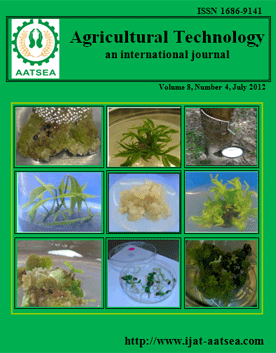ThaiScience
ThaiScience
INTERNATIONAL JOURNAL OF AGRICULTURAL TECHNOLOGY
Volume 15, No. 03, Month JULY, Year 2019, Pages 445 - 464
Variation in tolerance to salinity stress at the reproductive stage in a large fast neutron mutant rice (oryza sativa l.) population
Malumpong, C., Youngkom, P., Vanavichit, A. and Siang-Liw, M.
Abstract Download PDF
Rice is very sensitive to salinity stress during the reproductive stage and salinity stress causes reduced grain yields. The salinity concentration, critical point and phenotypic parameter of the reproductive stage were identified for screening a large fast neutron mutant population (M4). The results showed a 150 mM NaCl treated in irrigated water at the early booting stage (R2) had the greatest effect on flag leaf and panicle damage, and it also reduced seed setting, especially in susceptible genotype. However, seed setting was a suitable parameter for screening salinity tolerance in the large mutant population. Then, the 9,000 JHN mutant lines were screened for salinity tolerance under 150 mM NaCl at early R2 - R9. The result showed 5,397 mutant lines failed to produce seed setting and found 20 lines produced seed setting above 60% in the preliminary screening. In repeated screening, the 20 lines (M5) were confirmed a potential to produce seed set under salinity stress and found M1145 produced the highest seed set. Finally, the validated screening, M1145 showed a stable tolerance under salt stress and produced the highest seed setting at 48%, which was not significantly different from the standard salinity tolerant (Pokkali, FL496 and FL530). In conclusion, seed setting during salinity stress at reproductive stage was representative of salinity tolerance and can be used as a screening parameter for salinity tolerance on a large scale. In addition, the fast neutron mutant population showed variations in salinity tolerance levels, and M1145 was identified as a salinity tolerant and is a potential genetic stock for use in a salinity tolerance breeding program.
Keywords
rice (Oryza sativa L), salinity stress, salinity tolerance, seed setting, screening, large mutant populationINTERNATIONAL JOURNAL OF AGRICULTURAL TECHNOLOGY
Published by : Association of Agricultural Technology in Southeast Asia (AATSEA)
Contributions welcome at : http://www.ijat-aatsea.com
